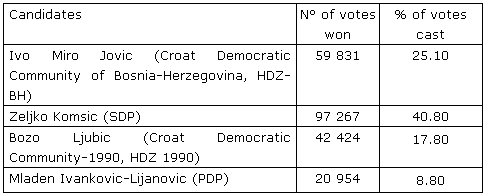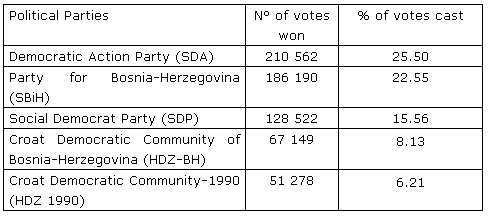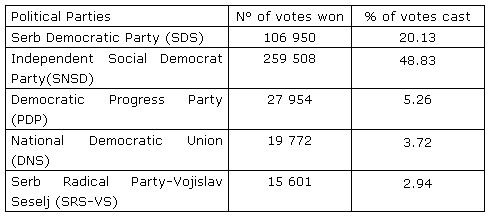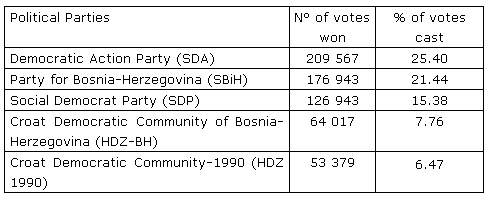News
Corinne Deloy,
Fondation Robert Schuman,
Helen Levy
-

Available versions :
EN

Corinne Deloy
Fondation Robert Schuman
Helen Levy
The "moderate parties" forged ahead of the nationalists in the presidential and general elections which took place on 1st October in Bosnia-Herzegovina.
The leader of the Party for Bosnia-Herzegovina (SB-H), former Prime Minister and Foreign Minister, Haris Silajdzic won his wager by clinching the election of the Collegial Presidency of the Republic of Bosnia-Herzegovina with 62.10% of the vote within the Muslim college. Nebojsa Radmanovic (Independent Social Democrat Party, SNSD) was elected by the Serb College with 54.80% of the vote whilst Zeljko Komsic (Social Democrat Party, SDP) won 40.80% of the vote thereby winning the Croat College.
Zeljko Komsic, a surprise winner, appears to be a moderate whilst Haris Silajdzic and Nebojsa Radmanovic have different views of the country's future, the first being in favour of a united Bosnia-Herzegovina, whilst the second supports the idea of a referendum on the separation from the Serb Republic. Zeljko Komsic, rejected by part of the Croat community, who accuse him of lacking in moral authority and object to his election on the vote of the Serb and Muslim communities expressed his thoughts in Le Monde on 11th October: "The future will tell us whether I am an accident of history or the gateway to a multiethnic society in which I believe."
The Democratic Action Party (SDA) led by Sulejman Tihic won in the general elections at the Chamber of Representatives of the Republic of Bosnia-Herzegovina by winning 25.50% of the vote, slightly ahead of the Party for Bosnia-Herzegovina which won 22.55% of the vote. The score achieved by the Democratic Action Party does not however enable it hold to the majority. The result was the same at the Chamber of Representatives of the Federation of Bosnia-Herzegovina where the Democratic Action Party won 25.40% of the votes whilst the Party for Bosnia-Herzegovina won 21.44% and the Social Democrat Party (SDP) 15.38%. As for the Serbs the Independent Social Democrat Party with 43.83% of the vote easily came ahead of the Democratic Party (SDS) which only won 20.13%.
In the Serb Republic, Milan Jelic (SNSD) was elected President of the Republic with 50.70% of the vote. The Independent Social Democrat party won in the elections of the National Assembly the only Chamber in the Serb Parliament by winning 44.95%. The Democratic Party (SDS) came second with 18.99% of the vote followed by the Democratic Progress Party (PDP) which won 7.13% of the vote.
The participation rate rose to 54.48% (53,93% in the Federation of Bosnia-Herzegovina and 56.11% in the Serb Republic) i.e. an almost identical rate to the one recorded in the previous elections on 5th October 2002 (- 0.5 point).
"These presidential and general elections have revealed the deep ethnic division in Bosnia-Herzegovina," maintained political analyst Tanja Topic. Indeed although the moderate parties led in the elections they disagree on the future of the country and the reforms to be adopted.
Presidential and General Election Results on 1st October 2006 in Bosnia-Herzegovina
Participation rate: 54.48%
Presidential Election of the Republic of Bosnia-Herzegovina
Muslim College

Croat College

Serb College

Presidential Election of the Serb Republic

General Elections[
Chamber of Representatives of the Republic of Bosnia-Herzegovina
Federation of Bosnia-Herzegovina

Serb Republic

Chamber of Representatives of the Federation of Bosnia-Herzegovina

National Assembly of the Serb Republic

On the same theme
To go further
Elections in Europe
Corinne Deloy
—
15 April 2025
Elections in Europe
Corinne Deloy
—
25 February 2025
Elections in Europe
Corinne Deloy
—
18 February 2025
Elections in Europe
Corinne Deloy
—
28 January 2025

The Letter
Schuman
European news of the week
Unique in its genre, with its 200,000 subscribers and its editions in 6 languages (French, English, German, Spanish, Polish and Ukrainian), it has brought to you, for 15 years, a summary of European news, more needed now than ever
Versions :



